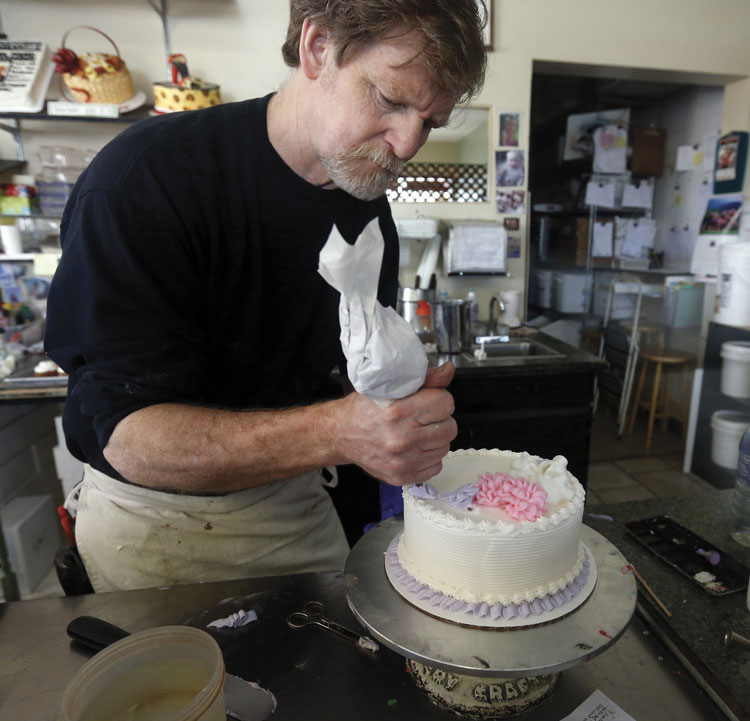Speech, religion and bias all weighed in Masterpiece Cakeshop case

Jack Phillips is a devout Christian who won't make cakes for some celebrations. AP Photo
The encounter in a Lakewood, Colorado, bakery was brief, but it has had a lasting impact on the lives of its central participants. And it has led to a major clash in the U.S. Supreme Court, pitting the rights of free speech and free exercise of religion against anti-discrimination law.
In July 2012, Charlie Craig, 37, and David Mullins, 33, visited Masterpiece Cakeshop with Craig’s mother, Deborah Munn, to buy a cake to celebrate their upcoming marriage. Colorado did not recognize same-sex marriage at the time, so Craig and Mullins were to be married in Massachusetts. They were planning a reception at a Denver-area restaurant, so they came to look at cakes.
While perusing pictures of the different cakes, Craig informed the owner that the cake was for his and his partner’s wedding, according to court papers.
The owner, Jack Phillips, 61, describes himself as a cake artist who creates elaborate confections for weddings and other occasions. He is a devout Christian who won’t even bake goods that have Halloween or bachelor party themes.
“So right away I’m thinking, ‘How can I tell them politely that I can’t take care of this wedding for them because I don’t do same-sex weddings,’ ” Phillips says. “That’s just against the core of who I am.”
He recalls telling the couple he’d make them birthday cakes, shower cakes, cookies or brownies. “Basically anything else for you,” Phillips says. “The wedding cake itself has so much significance because it’s part of a wedding and a marriage.”
NO CAKEWALK
The legal fight has led to the Supreme Court case Masterpiece Cakeshop v. Colorado Civil Rights Commission. It is one of the most debated and anticipated of the term, in no small part because it involves “the law of cake and whether cake speaks,” says Martin Lederman, an associate professor at Georgetown University Law Center.
As Lederman acknowledges, the case is at the forefront of a debate about whether various types of creative professionals must provide their services for same-sex weddings when they have religious objections. In addition to bakers, florists and photographers are included in this group.
“The majority of the justices think it’s a very bad idea—at least in the short run, until the nation becomes more reconciled to same-sex marriage—to require commercial vendors or others to participate in same-sex marriage when they don’t want to,” Lederman says.
The justices may have wished that Colorado lawmakers had provided some form of religious-conscience objection to its anti-discrimination law that covers sexual orientation, he adds, “but that’s a far cry from saying there’s a constitutional right to exempt oneself from those state statutes.”
Craig and Mullins, who ultimately received a donated cake featuring layers of rainbow colors for their wedding reception, filed complaints about Masterpiece Cakeshop with the Colorado Civil Rights Commission that they had been discriminated against based on their sexual orientation.
That led to proceedings before a state administrative law judge, who rejected Phillips’ free speech and free exercise claims. Because Craig and Mullins had never expressed to Phillips whether they wanted a particular message or design on the cake they sought, the baker had no free speech right to decline their request, the judge said.
The state civil rights panel upheld the judge’s findings, and it ordered Phillips to design wedding cakes for same-sex ceremonies if he also provides them for opposite-sex ones. He was required to re-educate his staff about the state’s anti-discrimination law.
(Phillips says he stopped providing wedding cakes in response, giving up 40 percent of his shop’s business.)
The Colorado Court of Appeals upheld the commission, ruling among other things that Phillips “does not convey a message supporting same-sex marriages merely by abiding by the law.”
The Colorado Supreme Court declined to hear the case. This led Phillips to ask the Supreme Court for review, which the justices granted at the end of last term after considering the case at more than a dozen of its private conferences.
This article appeared in the November 2017 ABA Journal magazine with the title "Cake Talk: Court to address whether baker who refused to create wedding cake for same-sex couple violated anti-discrimination law."



